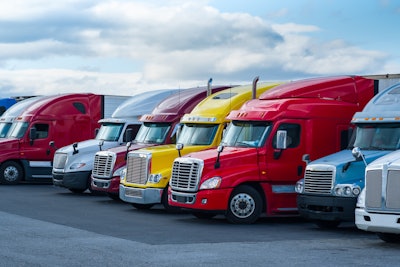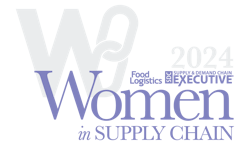
What a time to work in the supply chain industry. From port strikes and rail strikes to environmental, social, governance (ESG) regulations, electrification mandates and natural disasters shutting down major roads and ports, it’s a wonder any food and beverage moves through the cold chain.
But have no fear, it’s not all doom and gloom.
Food Logistics talks exclusively with Chris Burroughs, Transportation Intermediaries Association (TIA) about why the outlook for 2025 suggests a shift toward greater resilience, technological innovation, and a focus on sustainability.
CLICK HERE to read the full article.
Food Logistics: From your perspective, what are considered the Top 5 trends to watch in 2025? And why?
Chris Burroughs: I think the Top 5 trends to watch out for in 2025 could be fraud in the supply chain, labor regulations, supply chain disruptions, sustainability and technology and AI. I think some of these issues will vary in terms of importance depending on the 2024 elections and who controls the White House and Congress.
Food Logistics: Describe some of the challenges impacting many of today’s supply chains. This can include everything from port/rail strikes and ESG regulations to adopting technologies and more.
Burroughs: The No. 1 issue facing the freight brokerage industry is fraud in the supply chain that is costing the industry over a billion dollars on an annual basis. The types of fraud take many forms, including cargo theft, identity theft, unlawful brokerage activities, etc. Additionally, the industry is hampered in the motor carrier selection process as 92% of motor carriers are unrated due to an antiquated safety rating process. This lack of clarity from the Federal Motor Carrier Safety Administration (FMCSA) potentially allows unsafe carriers to continue to operate on the nation’s highways and creates confusing in the selection process leading to less safe roads and frivolous lawsuits.
Food Logistics: Describe the State of Transportation, and how factors such as port/rail strikes, electrification, trucking wages, trucking mandates, and more will affect the State of Transportation in 2024.
Burroughs: The state of the transportation in 2024 will be characterized by a complex interplay of labor dynamics, regulatory pressures, technological advancements and economic conditions. Stakeholders across the supply chain will navigate these challenges while striving for efficiency, sustainability and reliability in a marketplace in the face of ongoing changes, hard economic times, and innovation.
Food Logistics: The global container shipping industry continues to witness an increase in freight demand for U.S.-bound shipments. What does this mean? And what will this look like come 2025?
Burroughs: The rising demand for U.S. bound shipments reflects broader economic growth and trends and poses both challenges and opportunities for the global container shipping industry. Key topics to consider include increased capacity, port development projects, e-commerce growth, regulatory environment, and global trade relationships. How the industry adapts and reacts to these challenges and opportunities will play a critical role in shaping the future of the global container industry.
Food Logistics: Let’s talk State of Software and Technology. What kinds of emerging technologies are your company/your customers/your members implementing to improve resilience, transparency and visibility?
Burroughs: To enhance efficiency and improve service, our members are increasingly leveraging advanced technologies. Many brokers utilize digital platforms and software solutions that incorporate real-time tracking, automated load matching, and data analytics to optimize routes and reduce costs. Additionally, artificial intelligence and machine learning are being employed to predict market trends and identify the best shipping options, while cloud-based systems facilitate better communication and collaboration among stakeholders. This technological integration not only enhances operational efficiency but also improves transparency and responsiveness in the freight brokerage process.
Food Logistics: Let’s talk ESG regulations. Sustainability reporting is a big thing to come in 2025. Walk us through the steps your company/your customers/your members are taking to ensure ESG compliance.
Burroughs: Freight brokers are increasingly recognizing the importance of sustainability in their operations and are taking steps to incorporate sustainability reporting into their interactions with customers. By transparently sharing data on emissions, fuel efficiency, and environmental impact, brokers can help shippers understand the carbon footprint of their transportation choices. Many brokers are adopting green logistics practices, such as optimizing routes to minimize fuel consumption and collaborating with eco-friendly carriers. Additionally, they are using sustainability metrics to guide customers toward more responsible shipping options, thereby enhancing the overall value proposition. This commitment to sustainability not only meets the growing consumer demand for greener practices but also positions freight brokers as strategic partners in helping businesses achieve their environmental goals.
Food Logistics: When it comes to food safety, what actions are your company/your customers/your members taking to ensure compliance with regulations such FDA’s 24-hour rule and FSMA’s 204 Rule for example?
Burroughs: When it comes to food safety, freight brokers are taking proactive measures to ensure compliance with regulations such as the FDA’s 24-hour rule and the FSMA’s 204 Rule. They are implementing robust tracking systems to monitor the temperature and conditions of perishable goods throughout the shipping process, ensuring that products remain within safe limits. Brokers are also working closely with carriers that adhere to stringent food safety standards and certifications, thereby fostering a network of reliable partners. Additionally, many brokers are investing in training and resources to educate their teams on regulatory requirements and best practices for food handling. By maintaining detailed records and providing real-time visibility to their customers, freight brokers enhance accountability and help ensure that food products are transported safely and in compliance with all applicable regulations.
Food Logistics: How do other more global events such as the Russia/Ukraine War, hurricanes, the Red Sea attacks and more impact U.S. global supply chains? What is the outlook for 2025?
Burroughs: While global events continue to challenge U.S. supply chains, the outlook for 2025 suggests a shift toward greater resilience, technological innovation, and a focus on sustainability, as companies continue to adapt to an increasingly complex and interconnected world.



















